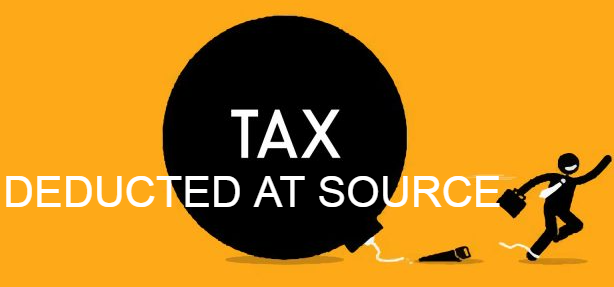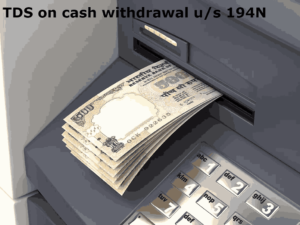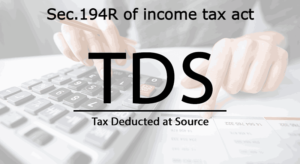The TDS in income tax act is introduced with aim to collect tax from various sources of income. TDS in income tax is an amount deducted by deductor or employer from tax payer and is deposited to govt. on behalf of taxpayer.
Further, TDS rates are on the basis of income of different tax payer, like TDS on salary, TDS on rent and TDS on professional fees.
What is the meaning of TDS in income tax act ?
Further, TDS in income tax act is a tax deducted at source. TDS is deducted at the time of payment. For instance, employer will deduct TDS on salary at the time of payment of salary to employees on monthly basis.
In brief , the person who makes payments is liable to deduct tax at source. Besides,the main objectives of implementing TDS provisions is to lowers the tax evision.
Who is liable to deduct TDS under income tax act?
1. You are an employee and your employer will deduct tax at source while paying salary at the average tax rate, if your income exceeds the basic exemption limit.
2. In case of rent payment by individual and Huf, where amount payable exceeds Rs. 50,000, then TDS at 5% will be deducted even if your books of accounts are not liable for audit.
3. TDS on professional fees
If you are working as professional then employer will deduct TDS as per applicable rate i.e. at 10%. In brief, as per section 194J of the Income Tax Act the maximum limit of Rs. 30,000 as applicable on payment of profession fees. It means that if the fees for the profession paid during the year exceeds Rs. 30,000 than TDS will be deducted on this amount.

Further if you don’t have PAN then TDS at 20% will be deducted. And in case fees for technical services ( which are not considered professional services ), than tax will be deducted at 2%.
Moreover, an Individual/Huf whose total turnover or gross receipts from business exceeds Rs. 2 cores in case of business or Rs. 5o lakh in case profession during fiscal year immediately preceding the one that interest is credited or paid must deduct TDS.
4. TDS on interest income is 10% if interest amount exceeds Rs. 10,000 for e.g. interest on fd etc.
5. You will not required to pay any tax if you submit investments proof(i.e. chapter via deductions)to your employer and your total income if below the exemption limit. Thus no TDS will be deducted in this case.
6. You can also submit form 15G or 15H to bank if total income is below exemption limit. ( i.e. Bank will not deduct TDS on your interest income like interest on FD etc.)
7. If TDS paid is more than your income tax liability than you can claim TDS as refund at the time of filing income tax return.
How many types of TDS Payment under income tax act ?
There are various types of TDS payment under income tax act are as follows:
TDS on –
Salary- https://taxandfinanceguide.com/tds-on-salary-u-s-192/
Rent
Bank Interest and other interest like int. on securities
Brokerage & Commission
Contractor payment
And remuneration payment to director of company
Deemed dividend
Professional fees
Transfer of immovable property like land and building
Winning from games like crossword puzzle , card lottery etc.
Who is liable to pay TDS to the government?
The person or taxpayer who deducts TDS is required to deposit TDS to the government on or before the due date.
What is the due date for TDS payment under income tax act for fy 2022-23?
Due date for e-filing TDS for fy 2022-23.
| Quarter | Period | Due date |
| 1 | April – June | 31st July 2022 |
| 2 | July – Sept | 31st Oct 2022 |
| 3 | Oct – Dec | 31st Jan 2023 |
| 4 | Jan – Mar | 31st May 2023 |
Steps to check TDS deduction status
Deductee can check TDS deduction status by following steps;
- Go to https://eportal.incometax.gov.in/iec/foservices/#/login portal
- Enter PAN and password to login to the portal
- And after logged in under ‘my account’ tab click on view form 26AS(Tax credit).
- Select year and PDF format to download file.
- Finally you can view all TDS deductions details.
How to claim TDS refund?
Again, If your tax deduction at source is more than actual income then you are eligible for TDS refund. Individual can claim TDS refund by filing income tax return. Once income tax return is filed, refund will be processed by income tax department and will be credited to your account within specified period of time.
What is TDS Certificate?
TDS certificate is issued by deductor to deductee. The TDS certificate is of two types i.e.
=> Form 16 for salary
=>And Form 16A for other than salary
Further, as per section 203 of the Income Tax Act, the deductor has to provide a TDS certificate to the deductee, indicating the amount of TDS deducted.
Purpose of TDS
- The main purpose of TDS is lowers the tax evasion.
- Moreover, the burden on tax collecting agencies reduces.
Example of TDS Payments
Mr. Aniket is an Chartered Accountant is providing professional service to ABC Ltd . And he charge fees Rs. 80,000 per month. Can TDS be deducted on professional services provided by Mr. Aniket?
Yes, ABC ltd will deduct TDS @10% on professional fees paid to Mr. Aniket i.e. 80,000*10% = 8,000
And this 8,000 will be deposited to govt on or before due date by ABC Ltd.
Frequently asked questions
1. PAN id required for payment of TDS?
Yes, if you don’t have PAN then TDS at 20% will be deducted.
2. How can I confirm whether TDS deducted has actually been paid or not?
Deductee can check TDS deduction status in form 26 AS by login into income tax website.
3. Who is liable for TDS Payment?
The person or taxpayer who deducts TDS is required to deposit TDS to the government on or before the due date.
4. Who is deductor of TDS payments?
Deductor may be any taxpayer who makes the payment like for salary deductor is an employee and in case of rent payment deductor is tenant.
5. What is the TDS rate on salary?
However, there is no fixed rate for TDS u/s 192. But TDS is deducted at average income tax rate for financial year.
6. Can TDS be deducted on Non Resident employee?
Yes, TDS is deducted on all employees if salary income exceeds basic exemption limit.




[…] https://taxandfinanceguide.com/what-is-tds-in-income-tax-act/ and […]